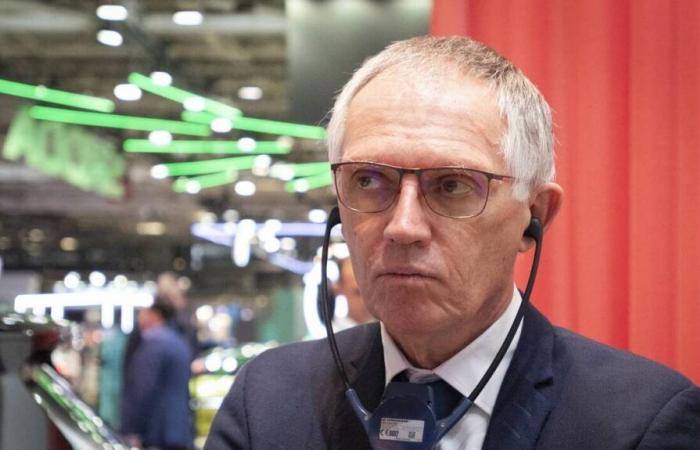
Passionate about automobiles and an uncompromising manager, Carlos Tavares helped make Stellantis a profit machine before difficulties accumulated recently, leading to the announcement of his resignation on Sunday December 1st.
From his appointment as head of the PSA group to his departure from Stellantis, a look back at the stages that marked the career of Carlos Tavares.
From Renault to Peugeot-Citroën
Born in Lisbon in 1958 and attended the French high school in the Portuguese capital, this central player launched his career at Renault, before leaving his position as number two in 2013, muzzled by the all-powerful CEO of the time, Carlos Ghosn .
In 2014, he took charge of the PSA group (Peugeot-Citroën), in dire straits, victim of the crisis which had caused the European market for new cars to plummet. PSA was narrowly saved from bankruptcy by the arrival of the French state and the Chinese manufacturer Dongfeng in its capital.
Two years later, PSA announced that it had reached a “profitability record”, a result achieved in particular thanks to a drastic reduction in the production costs of its vehicles.
The successful bet of the megamerger in 2021
Carlos Tavares then apparently succeeded in the mega-merger bet between PSA and FCA (Fiat-Chrysler): since the creation of this group with fourteen brands in 2021 – from Peugeot to Fiat via Chrysler and Maserati – Stellantis has had a series of net profit records.
At the start of 2023, the company notably announced the redistribution of 2 billion euros to its employees in the form of bonuses, ranging from €4,300 to €6,190. 4 billion euros were paid to shareholders the same year according to the CFDT Stellantis inter-union association.
While the French state is a shareholder in the group, a French government source interviewed by AFP stressed on Sunday that “Carlos Tavares will have led the acquisition of Opel in 10 years at the head of the group and then the merger of PSA and Fiat Chrysler Automobiles in 2021, after having managed the significant disruptions linked to the Covid crisis”.
The shortage of electronic chips, which limited the production of cars, helped Stellantis sell them at the highest prices.
The controversial figure of a “performance psychopath”
“The management of this company is not afraid of being unpopular,” replied Carlos Tavares to the unions who denounced his methods. The group's employees are regularly encouraged to leave, depending on job cuts plans. At the same time, Stellantis is increasingly relying on low-cost countries, such as Brazil, Morocco or Turkey, to manufacture its cars.
The Tavares method of reducing costs also involved putting pressure on suppliers. A union representative from Contitech, a subsidiary of Continental, denounced in the columns of West France in 2022 the “permanent pressure” exercised by Stellantis. “The financial results of our company are not good because the customers do not correctly value the price of our parts,” he estimated.
About the Portuguese boss, whom she worked with for “almost eight years” as a former central union delegate, the secretary of the CSE (CFDT) of the Rennes factory of La Janais Christine Virassamy spoke to AFP on Sunday “someone quite controversial”, who had designated himself as a “performance psychopath”.
In April 2024, the exceptional remuneration of 36.5 million euros granted by Stellantis shareholders to Carlos Tavares sparked heated controversy. He defended himself during a trip to Moselle, claiming that 90% of his salary was “made by the results of the company”. “If you think this is not acceptable, make a law and change the law and I will respect it,” he added. Already in 2022, Emmanuel Macron had judged “shocking and excessive” the amount “astronomical” of the remuneration of the general director.
Sales at half mast in 2024
After posting record performances in previous years, Stellantis coughed up the first half of 2024, with net profit halved. Before seeing its sales in the third quarter plunge by 27%, to 33 billion euros, weighed down by its difficulties in North America, with vehicles of criticized quality and prices considered too high.
Carlos Tavares had to abandon his sacred “double-digit” operating margin objective for the year at the end of September. “It is not Stellantis which is (in difficulty), isolated in the middle of the automobile industry […]It's Stellantis, Volkswagen, BMW, Mercedes, and it's probably not over yet, explained Carlos Tavares.
The forced electrification of the automobile complicates the prospects of these manufacturers in an already gloomy market. “Everyone has known the rules for a long time, everyone has had time to prepare, and so now we are racing,” launched Carlos Tavares in September in an interview with AFP, after having contested a transition for a long time “dogmatic” towards 100% electric in 2035.
The leader claimed to want “contribute to solving the problem” of global warming, for his four grandchildren, while protecting the “freedom of movement” citizens in their cars.
At the same time, he shook up the group's organization at the beginning of October, choosing more commercial profiles to boost sales.
The year 2024 was also marked by delays in the launches of several models, caused in particular by electronic problems. The drop in production in many factories did not fail to worry, as in Italy, home of Fiat, where thousands of demonstrators demanded accountability in mid-October.
Also read: REPORTING. In Turin, Stellantis workers feel like their factory is slowly dying out
In France, the group's management assured last week that no factory closures were planned in the short term despite an expected drop in production. But in the United Kingdom, the group announced the closure of its Vauxhall factory in Luton (north of London), employing more than 1,100 people.
An accelerated start
The board of directors had already suspended Carlos Tavares, 66, by announcing in early October his retirement by 2026 by launching a succession process. “If you ask my wife, she will say that it is a requirement on her part. I am a good husband,” the now ex-boss of Stellantis had certified a few weeks ago about his future retirement.
But disagreements hastened his departure. The board of directors, meeting on Sunday, “has accepted the resignation of Carlos Tavares,” said the parent company of Peugeot, Jeep and Fiat, in a press release. The planets were no longer aligned, with “different points of view” between the board of directors and the manager, explained Henri de Castries, director of Stellantis.
John Elkann, heir to the group's main shareholder, the Italian Agnelli family, had notably ruled out any merger with another automobile group, in an interview with AFP in October, while the Portuguese boss left the door open. The Italian business leader takes the helm of a new temporary executive committee.
The process of appointing the new general director of the group is already “on track” et “will be completed during the first half of 2025”, the group pointed out.





